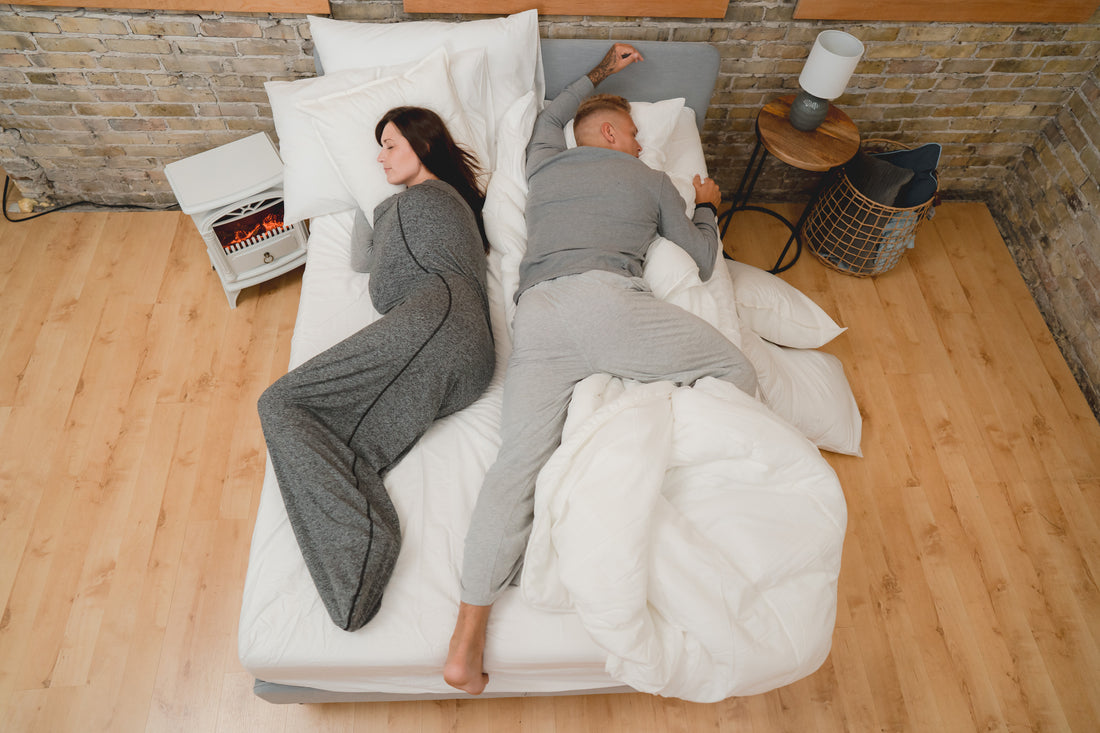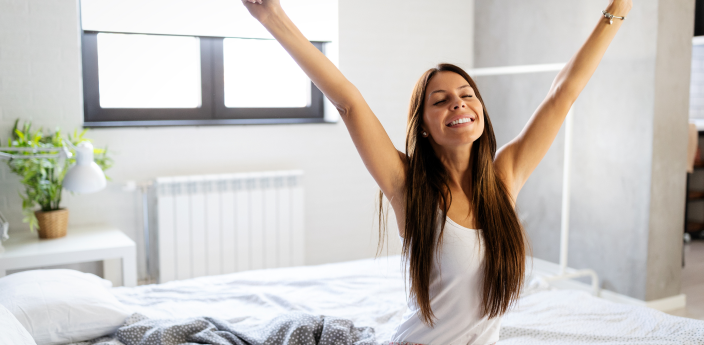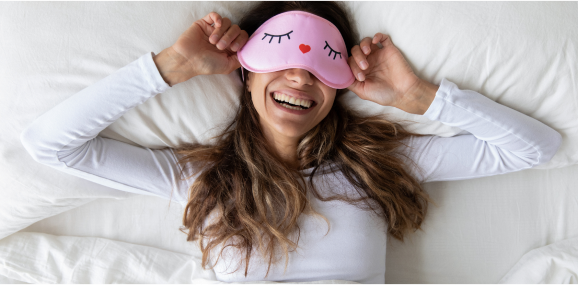As women get older, they eventually experience the discomfort of menopause. It is a natural thing that women go through, but that doesn’t make it any less hard. Not only does it impact daily life, but it can also negatively impact the ability to fall asleep, stay asleep throughout the night, and have a good quality night of sleep.
It might seem like a situation that’s tough to fight back against, but there are ways to improve your sleep while experiencing menopause.
In this article, we’ll talk through what exactly menopause is, its symptoms, how it impacts sleep, and what tools you can implement to work through it for a better night of sleep.
What Is Menopause?
Menopause can be defined as the end of a woman’s menstrual cycles, and it’s official after you’ve gone at least 12 months without a menstrual period.
Menopause is a natural biological process, and it usually happens to women who are in their 40s or 50s, though the average age in the United States for a woman with menopause is 51.
There is also a transitional time that happens before menopause. This is fittingly called the menopausal transition, or perimenopause, and usually occurs in the years leading up to the point of full-on menopause. This menopausal transition usually begins between the ages of 45 and 55, and lasts roughly seven years but could be as long as 14 years. The duration of this transitional time depends on many lifestyle factors, such as smoking, health conditions, and genetics.
During perimenopause, the body’s production of estrogen and progesterone, two of the hormones made by the ovaries, vary tremendously and decline in production. Estrogen and progesterone are hormones that are vital for sexual and reproductive health in women, and they help regulate a woman’s menstrual cycle and ability to conceive.
When perimenopause begins, it impacts the body in many different ways. The body begins to use energy differently, fat cells change, and women are more likely to gain weight. Changes can also occur to bone or heart health, body shape and composition, and physical functions because of the change in body chemistry.
Symptoms of menopause, as well as perimenopause, include:
- Irregular periods
- Hot flashes
- Vaginal dryness
- Chills
- Night sweats
- Mood changes
- Sleeping problems
- Weight gain and/or slowed metabolism
- Thinning hair and dry skin
- Loss of breast fullness
- Loss of bladder control
- Memory problems
- Muscles feel stiff or achy
Irregular periods are one very common symptom that occurs in women dealing with menopause. Irregular periods can be characterized by a multitude of traits, such as periods that are longer or shorter than usual, or lighter or heavier blood flow than usual.
Skipping periods during perimenopause is also common and expected. It’s important to note that despite irregular periods, pregnancy is still possible. Skipping a period could be a symptom of not only perimenopause, but pregnancy, so consider taking a pregnancy test or seeing a doctor if this occurs.
How Does Menopause Impact Sleep?
There are, unfortunately, many symptoms of menopause that can negatively impact how well you’re able to sleep at night. Every woman’s body and experience can be different during menopause, but there are a few symptoms that seem to be common in all women who are experiencing menopause that usually affect sleep.
Sleep issues during perimenopause and menopause are common, with sleep disorders affecting 39 to 47 percent of perimenopausal women and 35 to 60 percent of postmenopausal women.
On top of all of this, as we age, our sleep-wake cycle naturally changes and loses consistency. This causes us to feel tired earlier, wake up earlier in the morning, and get less sleep overall.
Changes in Estrogen and Progesterone
The hormones estrogen and progesterone are involved in bodily processes that affect mood, appetite, sleep, sex drive, and more. Progesterone can actually impact breathing drive, so lower levels may contribute to sleep disorders such as sleep apnea and other sleeping issues. Estrogen plays an important role in the metabolism of serotonin and other neurotransmitters that affect our sleep-wake cycle.
Estrogen also helps keep our body temperature regulated and low at night, leading to a more restful night of sleep. Estrogen also has an antidepressant effect — with less estrogen, women may experience higher body temperatures, lower quality of sleep, and mood swings.
Changes in Mood
Another factor that could negatively impact sleep for a woman going through menopause is how mood changes impact mental and emotional well-being. Due to the hormonal changes occurring, serious life changes can cause an immense amount of distress significantly more intense than what it would be with more balanced body chemistry. Examples of such life events include empty nesting, caring for aging parents, and concerns about their own aging.
Medications
As we age, our bodies age with us. Many women will begin taking medications that could interfere with their sleep. Medications that are taken for joint pains, body aches, and bladder problems can also contribute to sleeping problems, and are more commonly used during the menopause and perimenopause age range.
Hot Flashes
As mentioned previously, hot flashes and night sweats are common symptoms of perimenopause and menopause, and are large factors for loss of sleep. Experiencing a hot flash in the middle of the night can actually wake you up out of your sleep and cause you to be in a lot of discomfort, not to mention making you unable to fall back asleep. Waking up the next morning drenched in sweat and not feeling as if you’ve had a quality night of sleep is what many women go through.
Grace Pien, M.D., an assistant professor of medicine at the Johns Hopkins Sleep Disorder Center states that, “There are changes in the brain that lead to the hot flash itself, and those changes -- not just the feeling of heat -- may also be what triggers the awakening. Even women who don’t report sleep disturbances from hot flashes often say that they just have more trouble sleeping than they did before menopause.”
Sleeping while you’re hot or going back to sleep when you’re burning up is almost impossible. Feeling hot makes it hard to cool down, and actually impacts rapid eye movement (REM) sleep, the stage of sleep associated with the highest brain activity. This can lead to tossing, turning, and less dreaming.
During the other stage of sleep, known as non-REM, your body temperature is supposed to drop, helping you to have a deeper, higher quality night of sleep. If you are unable to drop your body temperature, this can impact non-REM sleep, as well as the overall quality of sleep you’re getting — well, not getting.
How Can I Sleep Better During Menopause?
While menopause can be a very uncomfortable and disheartening experience, there are a few things you can try that may be able to help you get the sleep you need.
Create a Relaxing Bedtime Routine
Develop a bedtime routine that cuts your stress, and thus keeps your body temperature lower at night. Stress can raise your body temperature, so don’t do anything near bedtime that might cause you to stress out, like sorting through bills or looking over taxes.
Try taking a bath, reading a good book, putting on your favorite jazz album, or journaling and reflecting about your day. You could even implement relaxation techniques such as meditation, deep breathing, or light yoga and stretching.
Avoid Nicotine, Caffeine, and Alcohol
Avoid any drinks or substances that could cause you to stay awake, such as nicotine, caffeine, or alcohol. This doesn’t mean you can never have these things, just try to have them earlier in the day instead. These substances can disrupt sleep and also lower your overall sleep quality because of how they interact with the body.
Though alcohol can help with falling asleep, it is more disruptive to sleep, particularly in the second half of the night. Irshaad Ebrahim, medical director at The London Sleep Centre in the U.K. states that alcohol also suppresses breathing and can precipitate sleep apnea, which are pauses in breathing that occur throughout the night.
Skip the glass of wine at dinner and instead have a glass of water to promote better sleep — just don’t drink too much or you’ll end up waking up anyway to use the restroom.
Maintain a Healthy Diet
Watching what you eat can help you sleep better during menopause. Avoid any large meals, or spicy and acidic foods before bedtime, which may increase your body temperature and trigger hot flashes.
Those hot wings might sound great, but they probably aren’t the best meal to have when it comes to food’s impact on your body temperature. Be mindful of what you’re putting in your body and at what time.
Dress to Keep Cool
Dressing cool for bed could also result in better sleep and decrease discomfort if hot flashes do occur. Try dressing in lightweight nightwear, like silk or bamboo, or put on clothing that is moisture-wicking.
Another option could always be to sleep naked — for this to work, you do still need lightweight blankets and light material bedding and sheets, such as cotton or microfiber.
Try the Sleep Pod
If you’re worried about being cold in lighter wear during sleep, try out the Sleep Pod. This blanket was designed for those people who are struggling to fall asleep, stay asleep, or experience quality sleep.
Based upon the science of Deep Touch Therapy, the Sleep Pod’s patented design provides a gentle and calming pressure to the entirety of the body, and promotes comfort-inducing relaxation. It feels as if you’re receiving a comforting bear hug all night long! This gentle pressure and stimulation can bring feelings of relaxation and can soothe tension that’s keeping you awake.
If you’re someone who experiences hot flashes but also doesn’t want to compromise sleeping with a blanket, this blanket is for you. It’s made from a specialized 4-way stretch material that is lightweight, breathable, and doesn’t trap heat. Hug Sleep’s newest design, the Sleep Pod Move, comes with an opening for your feet so you can have total feet freedom, added mobility, and an extra way to keep cool if needed.
A blanket that wraps you up tight for comfort and relaxation all night, while at the same time keeping you cool and regulated — what’s not to love?
Don’t Kiss Good Sleep Goodbye
Though menopause poses many challenges for women, it is not impossible to have a good night’s sleep while experiencing it. Everyone deserves a quality night of rest. Don’t give up hope for being able to catch more zzzs and dream more blissfully.
Whatever you implement in your life to work through your menopause to get better sleep — watching what you eat before bed, creating a cooling routine, or getting a Hug Sleep — a good night of sleep will be yours soon.
Sources:
Menopause: Symptoms and causes | Mayo Clinic
Understanding Hormones: The roles of Estrogen and Progesterone | MacArthur Medical Center
How Can Menopause Affect Sleep? | Sleep Foundation
How Does Menopause Affect My Sleep? | Hopkins Medicine

































500,000+ happy customers